Carhartt WIPs “Relevant Parties” with Chal Ravens
Carhartt WIP is also in the podcast business now. Is “Relevant Parties” a podcast for everyone or does it target a specific audience?
It’s definitely a specific audience, just because underground music continues to be a specialist interest – it’s not for everyone, and that’s also why people care so much about it, I think. Actually it’s been shown that 99% of streams are of the top 10% most popular tracks – which means that the other 1% must cover the remaining 90% of streamable music. Definitely a niche interest! But in fact that figure is a bit distorted because a lot of real heads aren’t just streaming music – they’re buying vinyl, downloading from Bandcamp, trading on Discogs, pirating on Soulseek, and all of that. Essentially, if you’ve bought a record in the last year then you’re probably in our target audience for Relevant Parties. Welcome!
What would you say is the future of independent labels?
Independent labels have pretty much outgrown their original mission, which was to escape the stranglehold of the major label system and build DIY distribution networks in order to give artists the freedom to create “uncommercial” work. These days musicians can do it all themselves on Bandcamp and through digital distributors like Tunecore. They can make professional sounding records in their bedrooms, with no need to hire a studio or a cutting lathe or whatever. But the best labels have always been about so much more than just shifting product. They can represent a new scene or a musical niche, the shifting sound of an IRL community or the idiosyncratic tastes of a single human being. My prediction is that the most impactful labels in the future will be the ones that create a community of artists and listeners – either on or offline – and make connections between artists who are doing something different.
What do you think about the choice of labels for this podcast?
The labels that appear in Volume One are certainly diverse – the one thing they have in common is that they prove there’s no “right” way to run a label. You’ve got the old pros like Ninja Tune and Stones Throw who’ve seen it all, having been around for decades – but they’ve moved with the times and managed to find their feet even as the major labels fumbled the transition from analog to digital. Then you’ve got younger outfits like Public Possession, who are still in their first decade but have been playing the long game from the start. Musically the six labels cover a lot of ground, from hip-hop to techno to ambient to synth-wave, and there’s an inevitable focus on electronic music. On a personal level, the guests are some of the most cool-headed people I’ve ever interviewed – perhaps an essential trait when you’re dealing with musicians for a living.
Do you listen to podcasts yourself? And also, where and when could you imagine people listening to “Relevant Parties”?
Weirdly I only got into podcasts properly in the last few years, during periods when I was spending more time on my own in various places. I used to listen to music when I was on the train or making dinner or whatever, but podcasts somehow fulfil a different role – they keep you company, so that you feel like you’re hanging out with people even when you’re just bopping around on your own. I got addicted to a podcast about consciousness and counterculture called Expanding Mind, and more recently I ate up a mini-series about the history of policing called Behind The Police. I usually listen when I’m walking along the canal or chopping vegetables for dinner – definitely not on public transport right now! So I’d suggest those wholesome activities as backgrounds for a healthy dose of podcast listening.
Corona has changed our idea of parties. What does your dream party look like right now? What are the components that make a good party to you?
Oh my god, at night I dream of going to a rave again. In hindsight, I’m grateful that I packed out my calendar at the beginning of the year with loads of nights out. One of the last parties I went to was with Eris Drew playing for hours and hours at a tiny venue in south London. Afterward, I resolved to become an Eris Drew ultra – any time she’s in town, I will be there. So Eris is definitely a key component of a good party. On top of that, it’s all about that nebulous thing we call “vibe,” isn’t it? I just want to feel like I’ve stepped into an alternate universe for a few hours. I want the girls to the front, smiling faces, no curfew and loads of space to actually get the fuck down. And definitely no masks. Ah, you’ve made me sad now.
Text: Pia Gebauer
Images: Reference Studios (PR)



